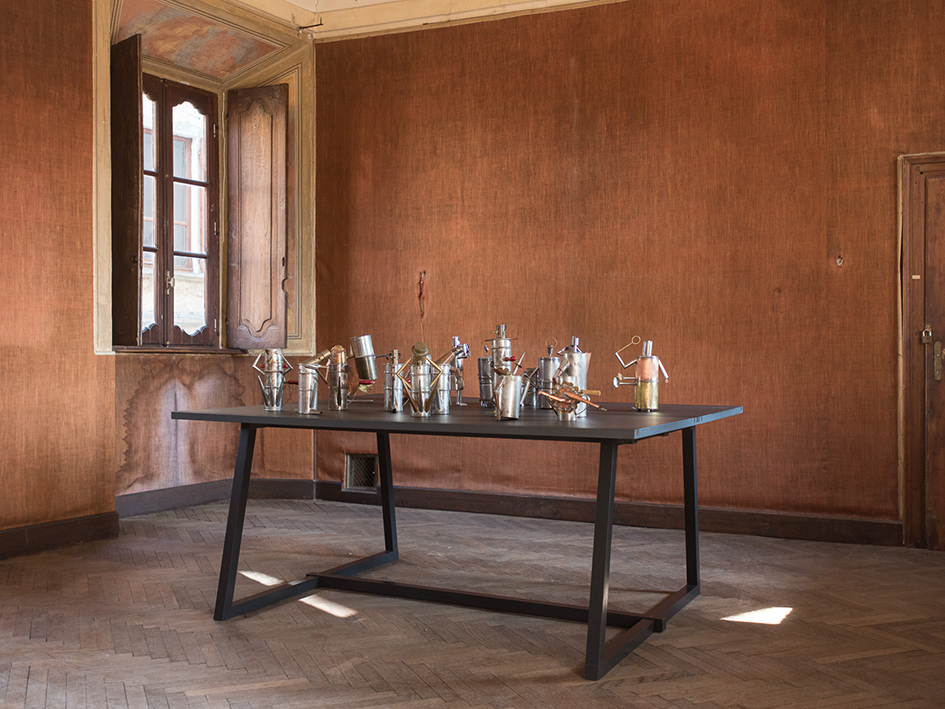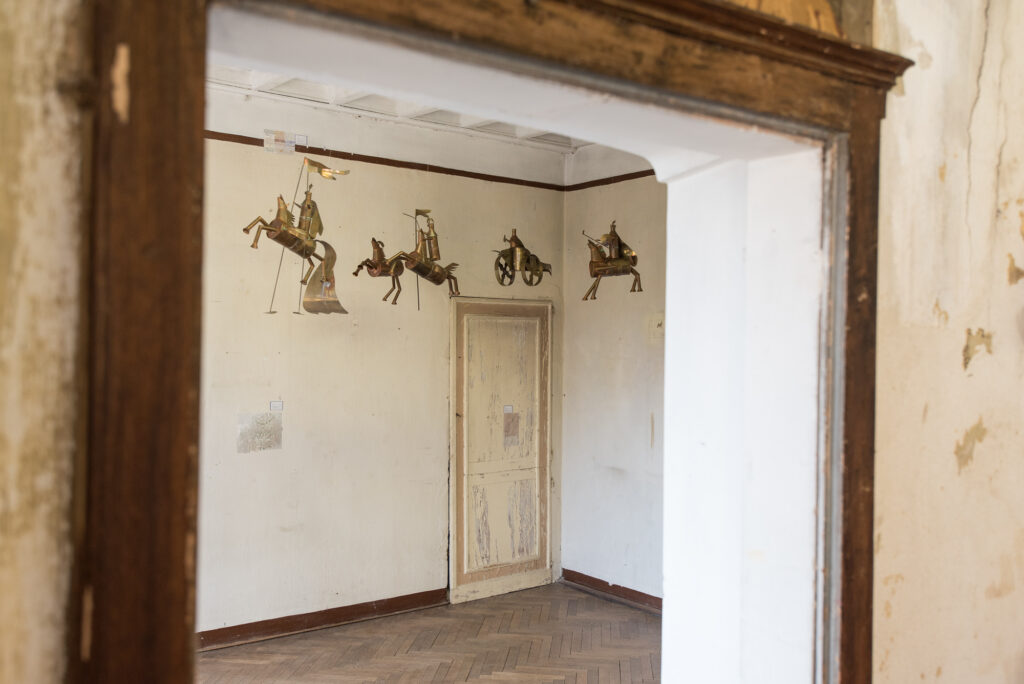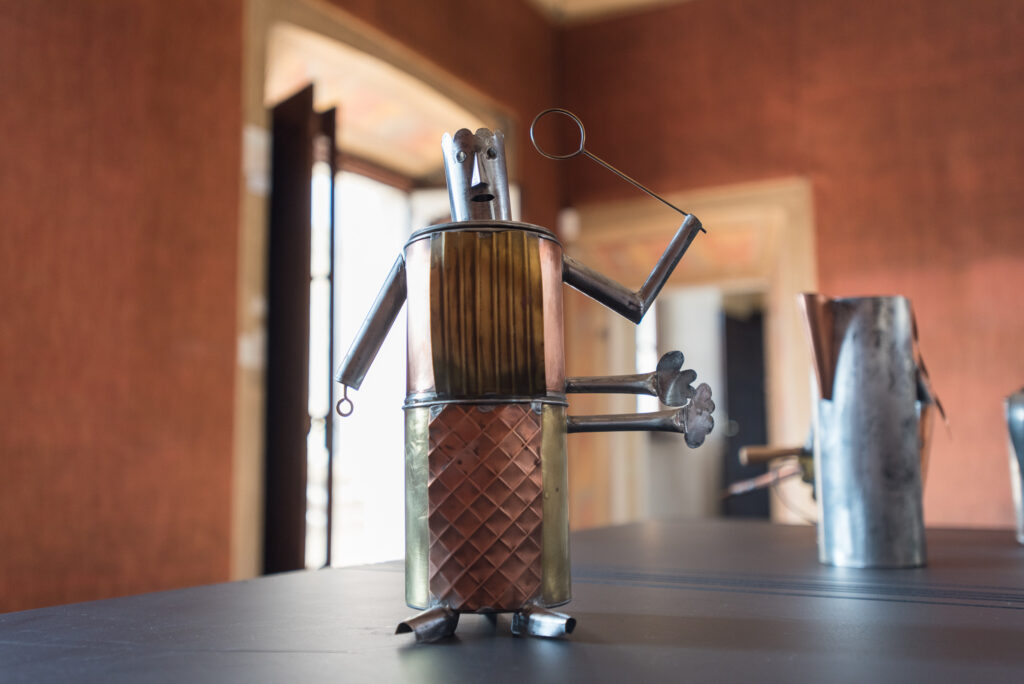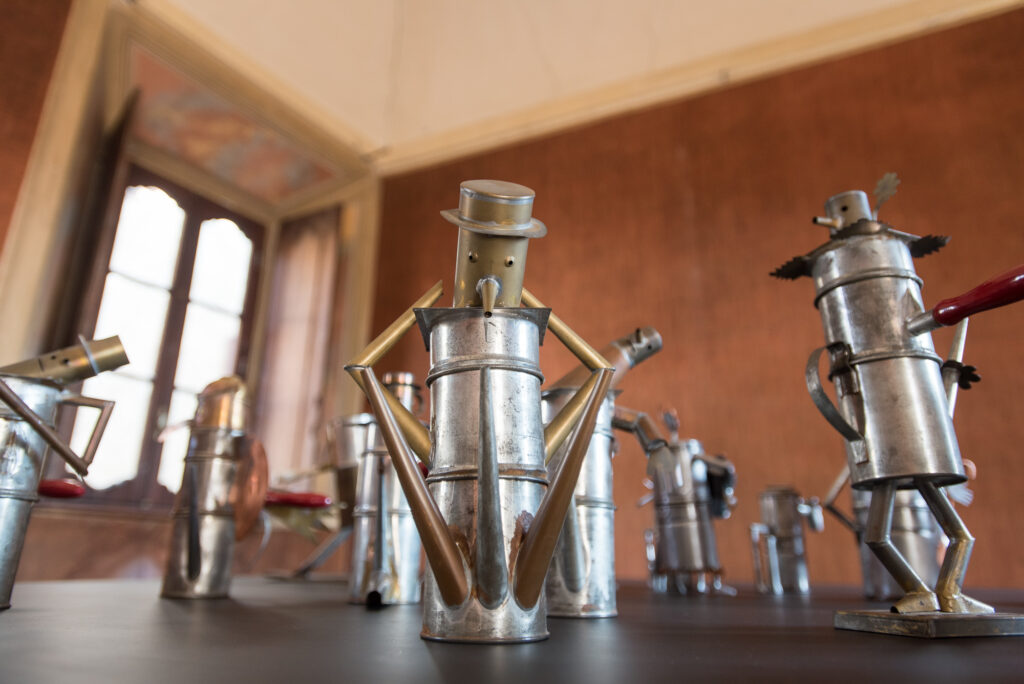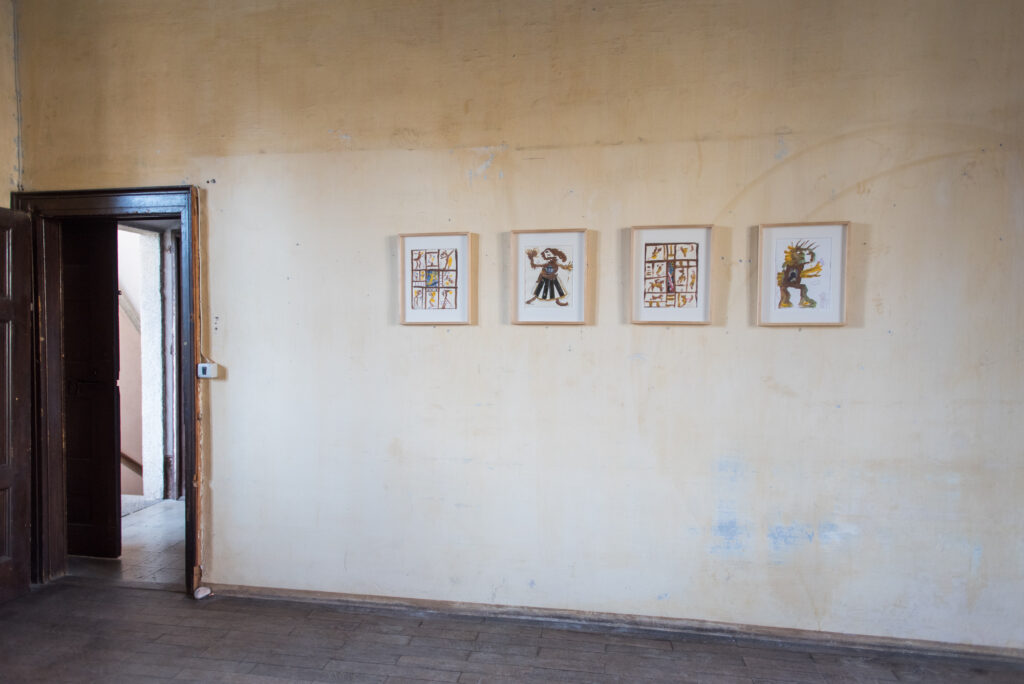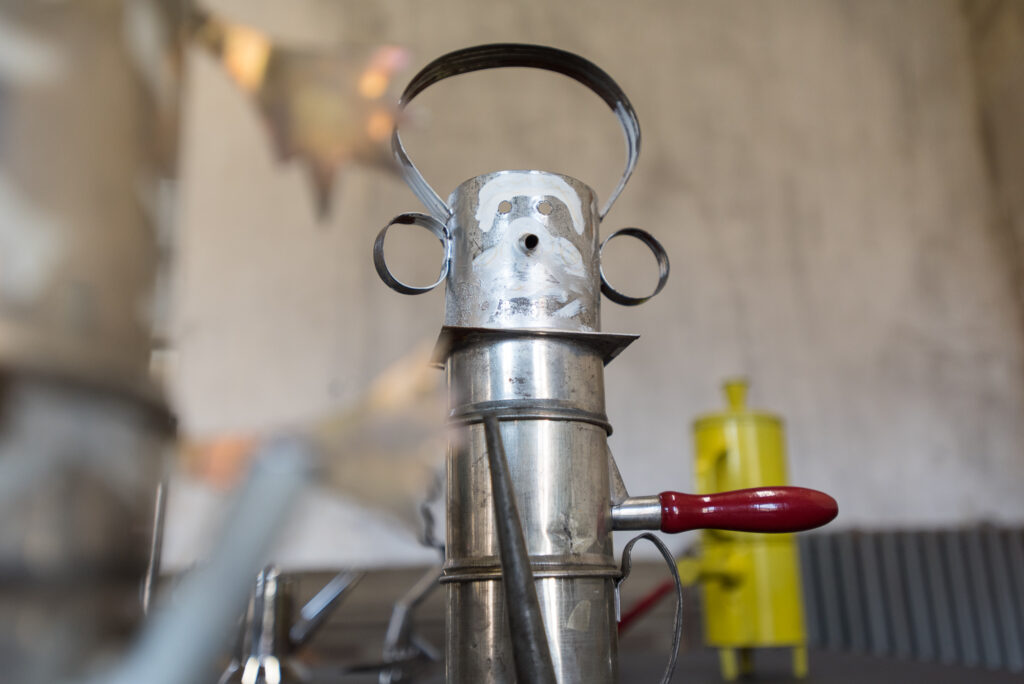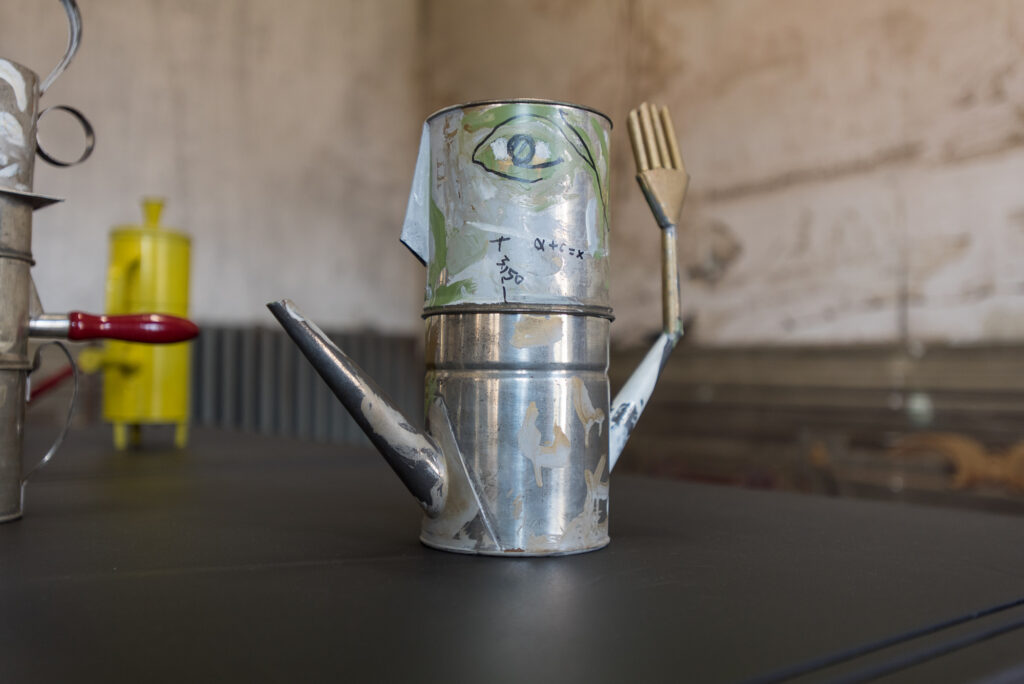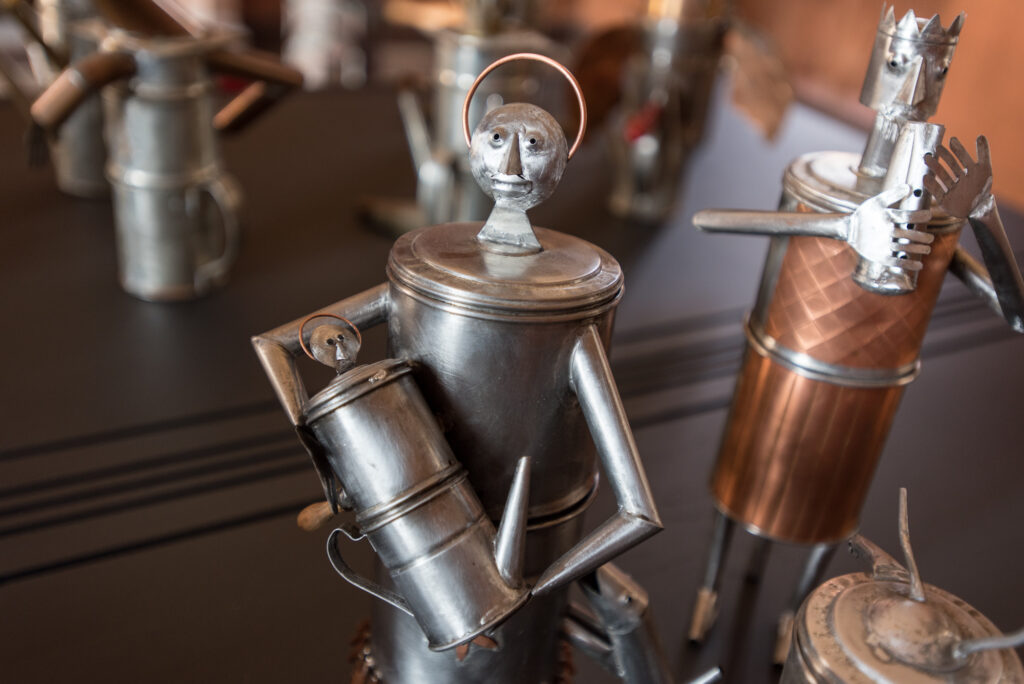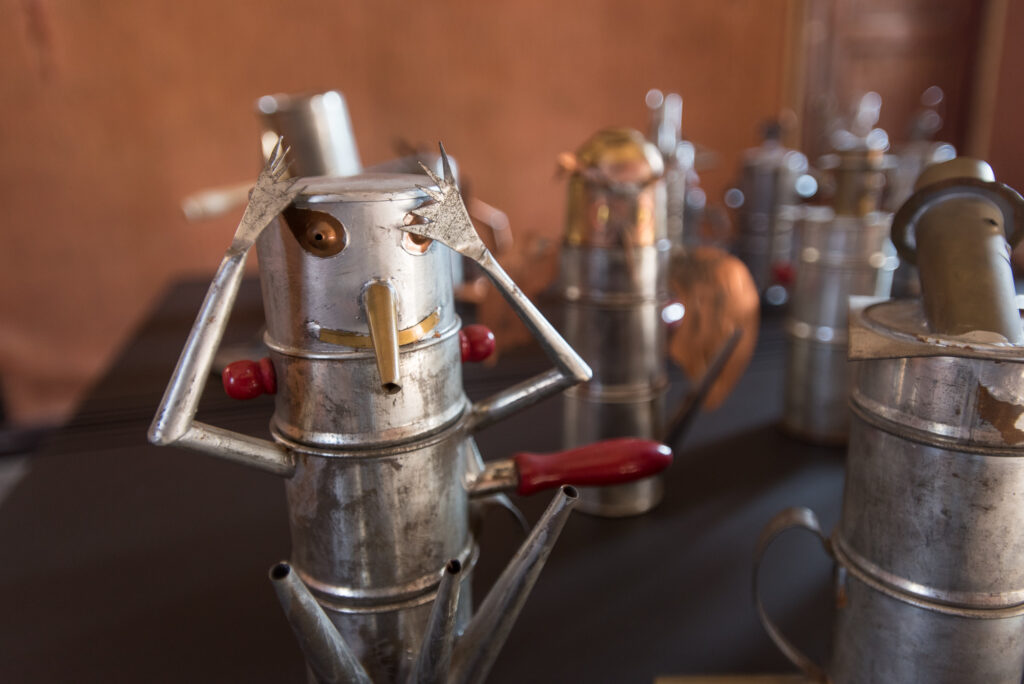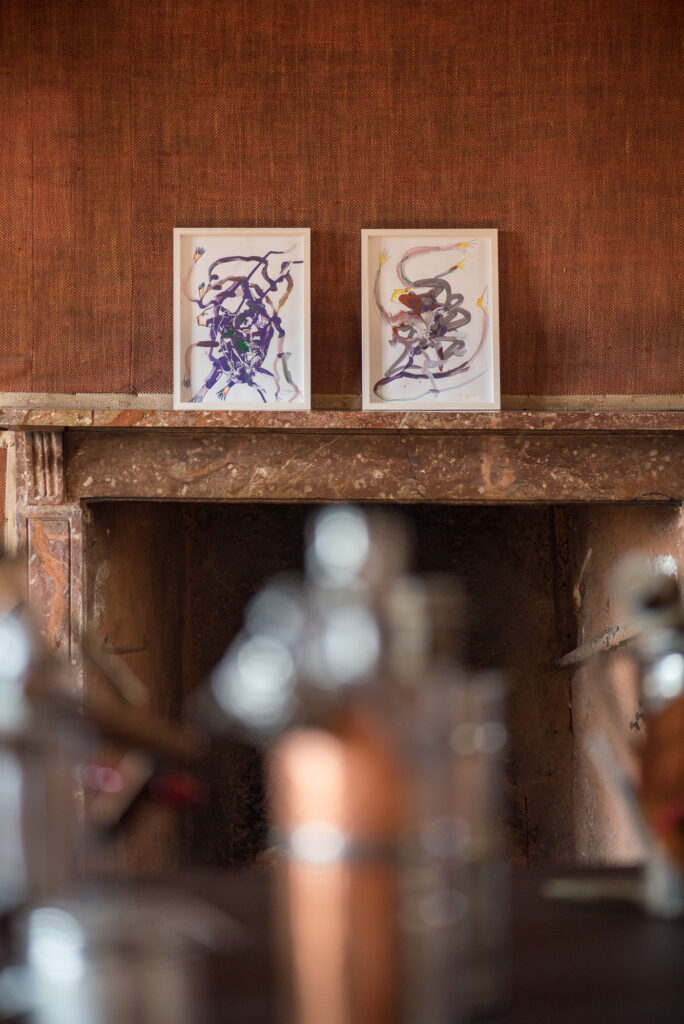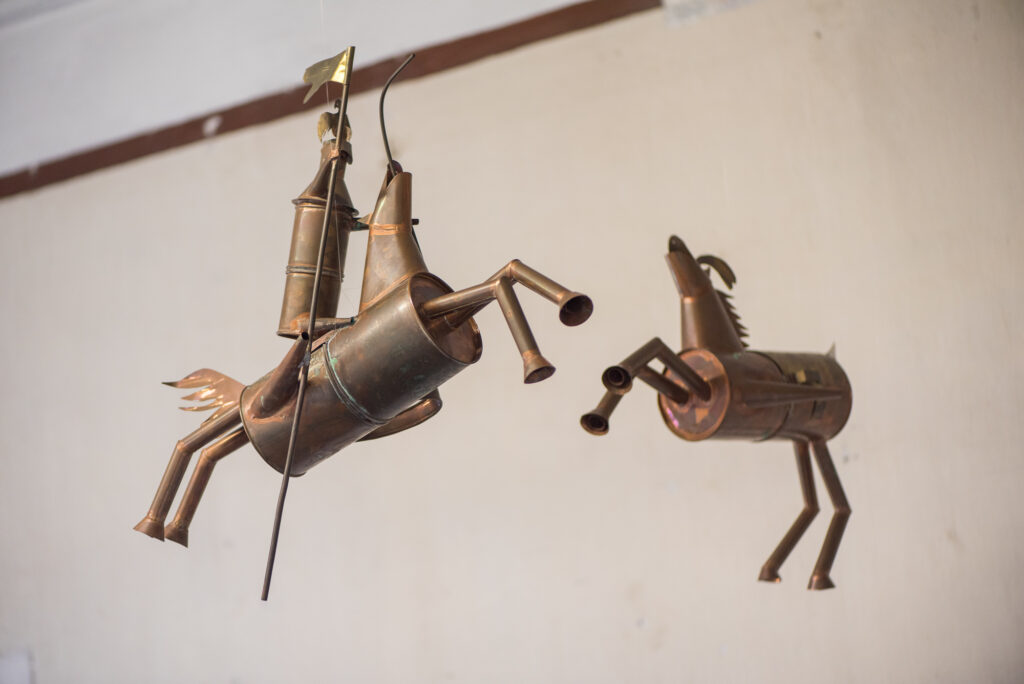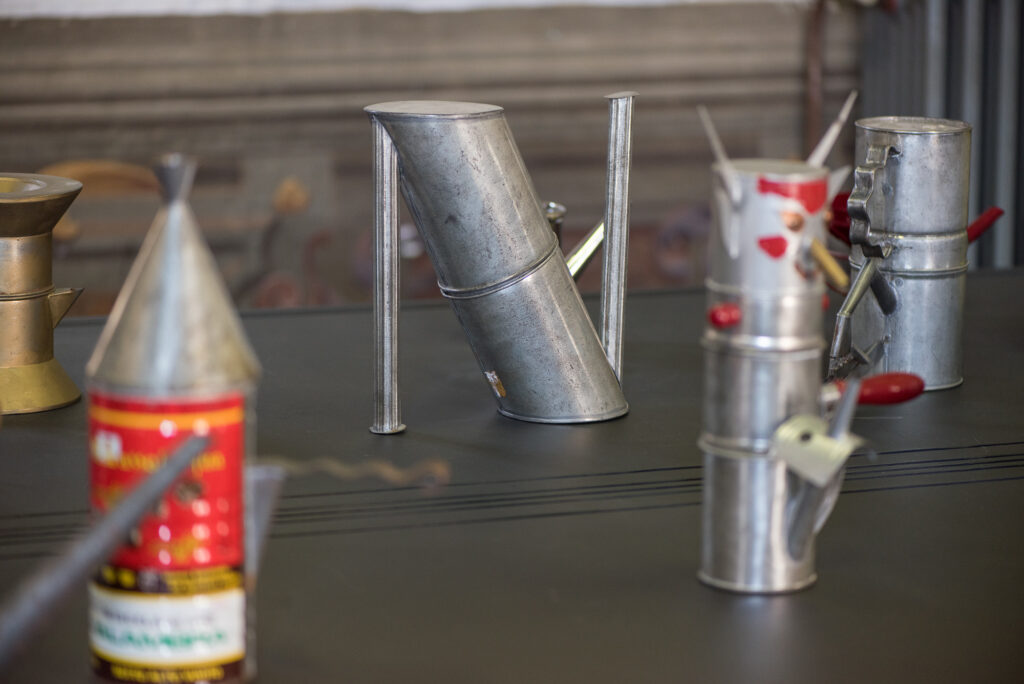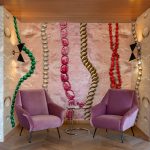Lago d’Orta Plastic Revolution
Le imperfezioni Feconde
Due week end di incontri, dibattiti, tavole rotonde per rendere omaggio a Riccardo Dalisi in un programma articolato per riflettere su plastica, bellezza e riuso tra arte, scienza, impresa, pensiero, curatela e progettualità condivise.
La concezione di Confine che Riccardo Dalisi ha elaborato nel tempo, ovvero quella di tappa da essere valicata, anche e soprattutto attraverso l’intelligenza emotiva che si avvale in seconda battuta di una funzione “ancillare ” da parte della mente, lo ha condotto a non sentirsi mai del tutto Radicale, oppure proprio per questo estremamente Radicale. L’idea, da lui sviluppata, di una progettazione condivisa con le “posture identitarie” più diverse, lo ha condotto a pensare che esistessero molteplici vie per interpretare il progetto e la processualità che lo riguarda intimamente. I concetti di segno come momento esperienziale, di design ultra poverista e, come conseguenza di questo, l’apertura all’idea di ” imperfezione feconda” lo hanno portato alla consapevolezza volta ad intendere il progetto come scrittura. Schizzo veloce veloce.
- Dalisi, Villa Nigra, ph. Francesco Lillo
E’ così che Marco Tagliafierro introduce Lago d’Orta Plastic Revolution, il progetto a cura di Associazione Asilo Bianco. Il festival apre il 25 marzo con l’inaugurazione di Scippare il segno: è il compito!, la mostra dedicata all’architetto e designer Riccardo Dalisi, cura di Enrica Borghi, realizzata in collaborazione con Corraini Edizioni, Museo Alessi, Archivio Riccardo Dalisi, con testi critici di Marco Tagliafierro. La visione e il pensiero di Dalisi accompagnano e ispirano tutte le giornate di Plastic Revolution, introdotte da una frase simbolo del maestro “Le Imperfezioni Feconde”.
- Dalisi, Villa Nigra, ph. Francesco Lillo
- Dalisi, Villa Nigra, ph. Francesco Lillo
Dalisi, mancato un anno fa nell’aprile 2022, è stato un uomo dai molteplici talenti, una figura capace di muoversi attraverso diversi linguaggi: designer, artigiano e poeta, progettista e architetto. Artista dalle mille sfaccettature, creativo da sempre ispirato da una straordinaria libertà di pensiero, uomo visionario e sognatore, grande interprete della realtà.
In mostra nelle sale di Villa Nigra disegni originali, schizzi e segni. Un percorso che segue l’idea di schizzismo con la quale Dalisi lega profondamente arte e pensiero: il segno da scippare, il gesto veloce sul foglio, lo schizzo aggrovigliato che, prima di farsi disegno, si fa anche e soprattutto pensiero, supera ogni intenzionalità e si presenta sul foglio come forza, impulso, lampo intuitivo che guida. Sono proprio queste le imperfezioni feconde di Dalisi, grovigli liberi e geniali nel loro essere imprevedibili e imperfetti, sempre portatori di senso, di non detto, nuove idee e orizzonti.
- Dalisi, Villa Nigra, ph. Francesco Lillo
Esposti molti degli oltre duecento prototipi realizzati da Dalisi per Alessi negli anni Settanta durante una incredibile ricerca che ha portato alla produzione della sua personalissima caffettiera napoletana per cui riceve nel 1981 il Compasso d’oro. Sono oggetti unici, estremamente espressivi e giocosi, la cui funzionalità scivola in secondo piano trasformandoli in vere e proprie opere d’arte. Il segno è a metà strada tra il gioco e il farsi oggetto con una precisa funzione, pensiero tecnico e icona di design.
- Dalisi, Villa Nigra, ph. Francesco Lillo
- Dalisi, Villa Nigra, ph. Francesco Lillo
Quella di Miasino è la prima occasione di riflessione sui disegni come “nuove geometrie generative”, sulle dinamiche libere e radicali di Dalisi, ma anche sulla serie di prototipi realizzati con Alessi che accompagnano la sua posizione teorica dedicata all’architettura. La tavola rotonda per rendere omaggio a questo incredibile personaggio e alla sua carriera inaugura la manifestazione in presenza di Alberto Alessi (Presidente Alessi), Alberto Biagetti e Laura Baldassari (Atelier Biagetti), Enrica Borghi (Presidente Asilo Bianco, artista), Pietro Corraini (Corraini Edizioni), Anna Maria Laville (Archivio Riccardo Dalisi), Marco Sammicheli (Direttore del Museo del Design Italiano, Triennale Milano), Marco Tagliafierro (critico d’arte, curatore indipendente e ideatore CONFINIS).
- Dalisi, Villa Nigra, ph. Francesco Lillo
- Dalisi, Villa Nigra, ph. Francesco Lillo
Domenica 26 marzo, a Orta San Giulio, proseguono i lavori con Mario Abis (sociologo), Massimiliano Caligara e Roberto Signorelli (Circolo Legambiente “Gli Amici del Lago”), Pietro Capella (Direttore Pop News), Andrea Castrovinci (ricercatore, PhD responsabile del Laboratorio di Ingegneria dei materiali polimerici, Scuola Universitaria Professionale della Svizzera Italiana SUPSI), Luca Cerizza (curatore e critico d’arte, docente alla NABA di Milano), Paolo Dago (autore televisivo), Barbara De Ponti (artista e docente), Paolo Antonio Zambianchi (Dottore geologo, Associazione Ardito Desio), moderano Enrica Borghi e Marco Tagliafierro.
- Dalisi, Villa Nigra, ph. Francesco Lillo
CURARE. Progettualità partecipata
il tema della pratica curatoriale riletto
attraverso il pensiero di Riccardo Dalisi
La rassegna continua il wend successivo con CURARE. Progettualità partecipata, a tutti gli effetti è un corso di formazione di alto livello – coordinato da Marco Tagliafierro e Giovanna Felluga – per curatori, operatori culturali e tutti coloro che si interfacciano con l’arte in una dimensione pubblica o privata con focus legato alle pratiche curatoriali condivise e inserite in una progettualità partecipata. L’obiettivo di questa due giorni di incontri e dibattiti consiste nel mappare la figura del curatore oggi, in rapporto a diversi settori e contesti d’azione, attraverso il punto di vista di importanti ospiti del mondo dell’arte, dell’impresa e della cultura at large.
- Dalisi, Villa Nigra, ph. Francesco Lillo
È Dalisi l’ispiratore: l’artista / designer è stato un grandissimo precursore di operazioni di arte partecipata e pubblica, celebri le sue lezioni pedagogiche con ragazzi e bambini dei rioni più duri e poveri di Napoli (Traiano, Scampia, Sanità), esplorazioni e relazioni a metà strada tra cultura e inclusione sociale. Il tema della pratica curatoriale riletto quindi attraverso il pensiero di Riccardo Dalisi per dare risposta a domande estrapolate dal suo pensiero, indagando sempre il rapporto identità-alterità, attivando una sorta di dissolvenza tra le discipline, considerando il confine tra le arti, gli ambiti dello scibile umano, i contesti del più diverso operare come tappe da oltrepassare, sfide da cercare:
è possibile parlare di una curatela condivisa?
è proficuo contemplare e voltare in positivo l’esperienza del fallimento?
e’ possibile intendere il progetto come scrittura?
una scrittura emotiva che prevede il supporto ancillare della ragione?
Tra i relatori di sabato 1 aprile: Corrado Beldì (Presidente Laterlite), Micol Beltramini (scrittrice e traduttrice), Antonella Cirigliano (Fondazione CROSS e CROSS Project), Daniela Fantini (Amministratore Delegato Fantini Rubinetti), Luigi Maffioli (Technical Director Gottifredi Maffioli Srl), Giuseppe Pero (Presidente Figli di Pinin Pero & C. Spa), Tommaso Sacchi (Assessore alla Cultura Comune di Milano), Donatella Spaziani (artista), Christian Tomadini (Managing Director Wall&decò), Luca Trevisani (artista).
Domenica 2 aprile: Benedetta Baraggioli (Cultural Project Manager del Comune di Novara), Nicolò Baraggioli (artista), Michele Chiossi (artista), Paolo Gonzato (artista), Milovan Farronato (co-fondatore Archivio Chiara Fumai, critico e curatore indipendente), Paola Manfredi (PCM Studio), Annika Pettini (scrittrice e responsabile cultura di ZERO), Lorenzo Vitturi (artista).
- Dalisi, Villa Nigra, ph. Francesco Lillo
Lago d’Orta Plastic Revolution
The fruitful imperfections
Two weekends of meetings, debates, round tables to pay homage to Riccardo Dalisi in a structured programme reflecting on plastic, beauty and reuse amongst art, science, business, thought, curatorship and shared planning.
The conception of Boundaries that Riccardo Dalisi has developed over time, i.e. that of a stage to be crossed, most of all through emotional intelligence which makes use of an “ancillary” function on the part of the mind, has led him to on one hand never feeling completely Radical, yet for the same reason extremely Radical. The idea, which he developed, of a design shared with the most diverse “identity postures”, led him to think that there were multiple ways to interpret both the project and the process that concerns him intimately. The concepts of symbols as an experiential moment, of super-impoverished design and, as a consequence of this, the openness to the idea of “fertile imperfection” brought him to an awareness aimed at understanding the project as writing. A very rapid sketch.
This is how Marco Tagliafierro introduces Lago d’Orta Plastic Revolution, the project curated by the Asilo Bianco Association.
The festival opens on March 25 with the inauguration of Scippare il segno: è il compito!, (Snatch the sign: that’s the task!), the exhibition dedicated to the architect and designer Riccardo Dalisi, curated by Enrica Borghi, created in collaboration with Corraini Edizioni, Alessi Museum, Riccardo Dalisi Archive, with critical texts by Marco Tagliafierro. Dalisi’s vision and thought accompany and inspire each day of Plastic Revolution, introduced by a symbolic phrase of the master “Le Imperfezioni Feconde”(The Fruitful Imperfections).
Dalisi, who passed away a year ago in April 2022, was a man of multiple talents, a figure capable of moving through diverse languages: designer, craftsman and poet, designer and architect. A multifaceted artist, creative always inspired by an extraordinary freedom of thought, a visionary and dreamer, a great interpreter of reality.
Original drawings, sketches and designs are on display in the rooms of Villa Nigra. A path that follows the idea of sketching, by means of which Dalisi deeply binds art and thought: the symbol to be stolen, the quick gesture on the sheet, the tangled sketch which, before becoming a drawing, also and above all becomes thought, overcomes all intentionality and appears on the sheet as a force, an impulse, an intuitive guiding flash. These are precisely the fruitful imperfections of Dalisi, free and ingenious tangles in their unpredictability and imperfections, always bearers of meaning, of the unsaid, of new ideas and horizons.
Many of the more than two hundred prototypes created by Dalisi for Alessi in the 1970s are exhibited during an incredible research period that led to the production of his very personal Neapolitan coffee maker for which he received the Golden Compass in 1981. They are unique, extremely expressive and playful objects, whose functionality slips into the background, transforming them into real works of art. The sketch is halfway between playfulness and becoming an object with a precise function, technical thought and an icon of design.
The Miasino setting is the first opportunity to reflect on drawings as “new generative geometries”, on Dalisi’s free and radical dynamics, but also on the series of prototypes made with Alessi that accompany his theoretical position dedicated to architecture. The round table to pay homage to this incredible character and his career inaugurates the face-to-face event in the presence of Alberto Alessi (President of Alessi), Alberto Biagetti and Laura Baldassari (Atelier Biagetti), Enrica Borghi (President of Asilo Bianco, artist), Pietro Corraini (Corraini Publishers), Anna Maria Laville (Riccardo Dalisi Archive), Marco Sammicheli (Director, Museum of Italian Design Milan Triennial), Marco Tagliafierro (art critic, independent curator and originator of CONFINIS).
Sunday 26 March, at the Orta San Giulio, the work continues with Mario Abis (sociologist), Massimiliano Caligara and Roberto Signorelli (Legambiente group “Friends of the Lake”), Pietro Capella (Director Pop News), Andrea Castrovinci (PhD researcher, head of the Polymeric Materials Engineering Laboratory, University of Applied Sciences and Arts of Southern Switzerland SUPSI), Luca Cerizza (curator and art critic, lecturer at NABA Milan), Paolo Dago (TV writer), Barbara De Ponti (artist and lecturer), Paolo Antonio Zambianchi (Doctor of geology, Ardito Desio Association), moderated by Enrica Borghi and Marco Tagliafierro.
CURARE. Participatory Design
The theme of curatorial practice reinterpreted
through the thinking of Riccardo Dalisi.
Two days of meetings and debates to map the figure of the curator today, in relation to different sectors and contexts of action, from the perspectives of important guests from the worlds of art, business and culture at large.
The review continues on the following weekend with CURARE. Participatory Design, in all respects a high-level training course – coordinated by Marco Tagliafierro and Giovanna Felluga – for curators, cultural operators and all those who interface with art in a public or private dimension with a focus linked to shared curatorial practices and inserted within participatory planning. The objective of these two days of meetings and debates is to map the figure of the curator today, in relation to different sectors and contexts of action, from the perspectives of important guests from the worlds of art, business and culture at large.
Dalisi is the inspiration: the artist / designer was a great forerunner of participatory and public art operations, his teaching sessions with children and young people from the toughest and poorest districts of Naples (Traiano, Scampia, Sanità) are celebrated, explorations and relationships midway between culture and social inclusion. Therefore, the theme of curatorial practice will be re-read through the thought of Riccardo Dalisi to answer questions extrapolated from his thought, always investigating the relationship between identity and otherness, aiming to somehow dissolve the borders between disciplines, considering the boundary between the arts, the spheres of human knowledge, the contexts of the most diverse work as stages to be crossed, challenges to be sought:
Is it possible to talk about a shared curatorship?
Is it fruitful to contemplate and turn the experience of failure into a positive one?
Is it possible to propose a project in written form?
An emotive writing that requires the ancillary support of reason?
Among the speakers of Saturday 1 April: Corrado Beldì (President Laterlite), Micol Beltramini (writer and translator), Antonella Cirigliano (CROSS Foundation and CROSS Project), Daniela Fantini (CEO Fantini Rubinetti), Luigi Maffioli (Technical Director Gottifredi Maffioli Srl), Giuseppe Pero (President Figli di Pinin Pero & C. Spa), Tommaso Sacchi (Councillor for Culture of the Municipality of Milan), Donatella Spaziani (artist), Christian Tomadini (Managing Director Wall&decò), Luca Trevisani (artist).
Sunday 2 April: Benedetta Baraggioli (Cultural Project Manager Municipality of Novara), Nicolò Baraggioli (artist), Michele Chiossi (artist), Paolo Gonzato (artist), Milovan Farronato (co-founder Chiara Fumai Archive, independent critic and curator), Paola Manfredi (PCM Studio), Annika Pettini (writer and cultural director of ZERO), Lorenzo Vitturi (artist).

